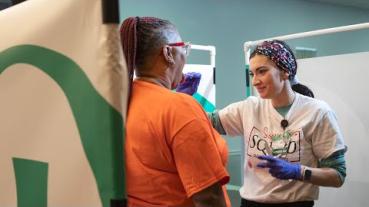Three Rush University faculty members have been chosen as scholar award recipients by the Rush BMO Institute for Health Equity and the inaugural RBIHE Health Equity Research Scholars Program. The Institute was established in 2021 with a $10 million donation from BMO Financial Group to coordinate, scale, and sustain Rush University System for Health’s health equity programs in the communities we serve. From preparing health care providers who can understand and address social determinants of health to identifying solutions that make the most significant impact on life expectancy, the Rush BMO Institute is how we bring our health equity strategy to life.
The Health Equity Research Scholars Program has the following goals:
- Expand the number of health equity researchers at Rush University Medical Center conducting externally funded projects to eliminate health inequities.
- Facilitate the design, implementation and dissemination of community-partnered health equity research.
- Mentor future researchers and create a research pipeline to make measurable improvements in the communities Rush serves.
- Support Rush University faculty members in developing a research program that will identify evidence-based approaches to improving health equity.
In November 2021, the program called for applications from Rush University faculty members, and three outstanding scholars were selected to receive RBIHE scholarships. The scholars selected are: Chuka Nestor Emezue, PhD, MPH, MPA, Anne Hoffmann, PhD, CCC-SLP and Chien-Ching Li, PhD, MPH. The scholarships provide 30% salary time for 18 months, mentorship support and $10,000 of pilot program funding for non-labor expenses. Hoffmann notes, “This scholarship is giving me the most valuable commodity, time so that I can foster a program that has the potential to create so many meaningful partnerships. I am excited to be a part of it as it will benefit both Rush and the community we serve.”
Meet our scholars

Chien-Ching Li, PhD, MPH, an associate professor and health service researcher in the College of Health Sciences’ Department of Health Systems Management. He completed his PhD in public health studies with a concentration in health services research at Saint Louis University, training in applied research methodologies, health economics and evaluation, and quantitative and epidemiological research.
The Research Project: Focuses on increasing the underserved Chinese American population’s capacity to respond to increasing rates of Alzheimer’s disease. Alzheimer's disease and Alzheimer's disease-related dementias (ADRD) are prevalent mental disorders and a leading cause of death among elderly people. In the United States, the Chinese American population is aging rapidly. It is anticipated that older Chinese Americans and their caregivers will increasingly need to make ADRD care decisions.
Outcome Goals: Develop linguistically and culturally targeted aid for caregivers of Chinese Americans living with ADRD to facilitate decision-making about advanced care plans. Chien-Ching’s research mentor is Olimpia Paun, PhD, PMHCNS-BC, a professor in the College of Nursing’s Department of Community Systems and Mental Health Nursing.
Li states,“Health equity research, especially among older immigrant population, is always my passion. The generous support from the RBIHE Scholar Program allows me to better partner with local Chinese American community in Chicago and promote health equity in access to care among this vulnerable population.”

Anne Hoffmann, PhD, CCC-SLP, has a clinical background as a speech-language pathologist and a PhD in speech and hearing science. She completed a post-doctoral position in the Department of Pediatrics at Rush University Medical Center and has maintained a joint appointment in Pediatrics since joining the faculty of the College of Health Sciences’ Department of Communication Disorders and Sciences, where she is an assistant professor.
The Research Project: Examines how to support child care providers in under-resourced communities. Research has indicated that supporting early child development leads to better lifelong outcomes. However, many children with developmental delays are either not being identified by the system or have been identified may not be receiving necessary services, due to limited resources. This program will use a caregiver coaching model; Hoffmann will lead training of graduate speech-language pathology students to provide caregiver coaching in child care centers on Chicago’s West Side. By partnering with child care providers, the potential impact of this program will not only include children currently in care but will pave the way for future child care opportunities.
Outcome Goals: Learn how to provide child care professionals with additional tools for supporting children’s development while training future clinicians in a best practice intervention model. Hoffmann’s research mentor is Allison Wainer, PhD, an assistant professor in Rush Medical College’s Department of Psychiatry and Behavioral Sciences.

Chuka Nestor Emezue, PhD, MPH, MPA, is a digital health researcher and assistant professor in the College of Nursing’s Department of Women, Children and Family Nursing. Emezue earned a PhD in nursing, a Master of Public Health, and a Master of Public Affairs from the University of Missouri-Columbia.
The Research Project: Focuses on developing, pilot testing and deploying technology-enhanced interventions that address overlapping interpersonal violence, mental health co-morbidities and substance use in young Black males (ages 18 to 24 years). This project responds to research that reports that one in four women and one in nine men in the United States report experiencing partner violence.
Men who abuse intimate partners are often court-ordered to participate in a rehabilitation program. However, co-occurring substance use, along with other variables such as mistrust of the legal and medical systems, and competing life issues, result in up to half of these males dropping out of programs in the first three months.
This research project uses a novel approach and will utilize SecondACT intervention — a web-based continuing care approach that Emezue developed — mixed methodologies and a community-based approach to create a culturally appropriate, provider-mediated online intervention for young Black males in Chicago experiencing partner violence and substance use-related aggression. This approach offers a critical shift to the existing agenda of most rehab programs from why men are expected to change to how to change while centering community assets and strengths.
Outcome Goals: Mitigate social and structural barriers to help prevent relapse to violence and substance use among lower-income Black fathers and adult males who are violent in the home. Additionally, a promising outcome of this study is to empower violence-affected males to be better fathers, co-workers, sons and friends by combining trauma-informed behavior change approaches with functional real-world life skills. Emezue’s research mentor is Wrenetha Julion, PhD, MPH, RN, FAAN, CNL, the College of Nursing’s associate dean for equity and inclusion and a professor in the Department of Women, Children, and Family Nursing.
Emezue states, “The Health Equity Research Scholars Program has adopted a multimodal strategy to centering health equity and an opportunity to build and sustain research that seeks to amplify the voice of young Black men who are disproportionately victims, witnesses, and perpetrators of violence.”
We celebrate and congratulate these outstanding individuals, their mentors, the Health Equity Research Scholars Program co-chairs and the application reviewers, including Elizabeth Lynch, PhD, Tricia Johnson, PhD, Zoe Arvanitakis, MD, M. Saleem Bhat, PhD, Sumihiro Suzuki, PhD and Madeline S. Moody, administrative project assistant, Rush BMO Institute for Health Equity.
This program will support Rush’s commitment to improve health and create a model of research to assist similar communities.




